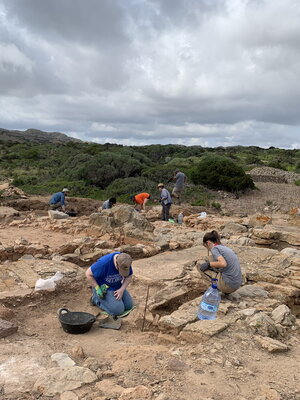
In the summer of 2024, graduate student Cade Meinel traveled to the Sanisera Archaeological Institute on the island of Menorca. He was the recipient of the 2024 J. David Hoeveler Summer Research Scholarship. Read about his journey below.
I completed my pre-dissertation research trip this June to the Sanisera Archaeological Institute on the island of Menorca within the Balearic Islands off the Mediterranean coast of Spain and successfully learned about Roman and late-antique material culture and general archaeological methods in ways that will aid my research into piracy and naval conflicts in relation to late-antique Mediterranean maritime communities during late antiquity.
While there, I aided in excavations of a Roman basilica from the fifth or sixth centuries AD. The basilica was located in the ancient Roman port city on the northern coast of the island called Sanisera. Most of the city remains unexcavated. While digging there, my group was initially assigned to an area believed to be outside the south wall of the basilica in order to discover what was adjacent to the basilica, but it turned out, based on the artifacts found in this area, that it was actually another room still inside of the basilica. The main finds that indicated this conclusion were a portion of wall structure and some marble, which would have been used inside the basilica. Other artifacts that I found included pieces of lead, Roman glass, bone, bronze nails, and various types of pottery. The coolest one that I personally found was a piece of Roman glass that had been at the base of a wide cup.
Also, I learned the techniques for recording evidence and progress during the excavation involving including the proper photographing techniques and the use of geo-positioning specific finds of significance. The hands-on experience will help me both to understand scholarship on archaeological sites and to know the amount of work and size of projects required to gain different types of information and details about late-antique history, and this understanding will be useful for my dissertation research. I also learned how to clean, classify, recognize, and label many forms of pottery and other small finds from throughout the Roman period for use in museum collections.
The benefits of traveling to Menorca included visiting a number of museums on the island that already had other artifacts and information about its ancient and late-antique history, which helped me to contextualize the work that I was doing. Lastly, making connections and having discussions with the director of the program also gave me insights into the historiography and particular aspects of the state of research in my field. Thus, my experience has set me up well to narrow and focus my research within my dissertation topic.
By Cade Meinel